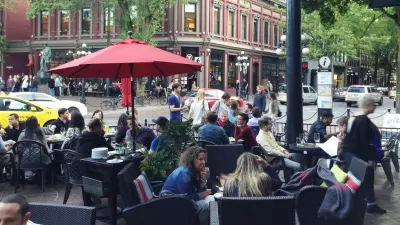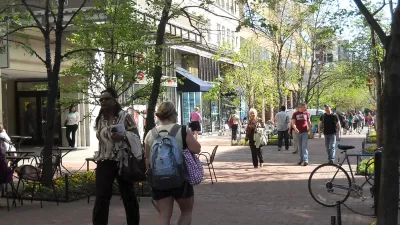Tim Pittman makes the case that cities can make us healthier – provided we can get out of our cars – and advocates a shift in the conversation about designing cities for people.
Urban life presents a variety of challenges to personal health, from sedentary jobs to air pollution to the stress of long commutes behind the wheel. But simply designing cities for pedestrians and cyclists, Pittman argues, can have a profound impact on health in a city.
Thus, shifting the focus of the transportation discussion from sustainability to longevity can change the way we look at policy solutions. "A hybrid car, for instance, may be excellent for the environment but makes us no less sedentary." Instead, compact and pedestrian-friendly land uses can promote healthier habits on an individual level, reducing the burden of healthcare costs.
An equally important shift in the dialogue, Pittman points out, is to broaden the scope beyond hot-topic, global cities like New York and Copenhagen. "Addressing problems of health at a meaningful scale will mean contending with the realities of all our cities, not just those where it's easiest or where we can be most opportunistic." The modern epidemics of diabetes and obesity are equally pressing in cities like Atlanta, Houston, and Phoenix, where alternative urban policy may not be as readily embraced.
"In the U.S., many of the communities built in the past 50 years have regressed," Pittman writes. "Cities designed and built around the car have 'engineered walking and bicycling out' of many of our communities... And as other countries pursue economic growth, and the follow-on urbanization, many have emulated our failed approaches compounding the problem globally."
FULL STORY: Can cities make us healthier?

Maui's Vacation Rental Debate Turns Ugly
Verbal attacks, misinformation campaigns and fistfights plague a high-stakes debate to convert thousands of vacation rentals into long-term housing.

Planetizen Federal Action Tracker
A weekly monitor of how Trump’s orders and actions are impacting planners and planning in America.

San Francisco Suspends Traffic Calming Amidst Record Deaths
Citing “a challenging fiscal landscape,” the city will cease the program on the heels of 42 traffic deaths, including 24 pedestrians.

Defunct Pittsburgh Power Plant to Become Residential Tower
A decommissioned steam heat plant will be redeveloped into almost 100 affordable housing units.

Trump Prompts Restructuring of Transportation Research Board in “Unprecedented Overreach”
The TRB has eliminated more than half of its committees including those focused on climate, equity, and cities.

Amtrak Rolls Out New Orleans to Alabama “Mardi Gras” Train
The new service will operate morning and evening departures between Mobile and New Orleans.
Urban Design for Planners 1: Software Tools
This six-course series explores essential urban design concepts using open source software and equips planners with the tools they need to participate fully in the urban design process.
Planning for Universal Design
Learn the tools for implementing Universal Design in planning regulations.
Heyer Gruel & Associates PA
JM Goldson LLC
Custer County Colorado
City of Camden Redevelopment Agency
City of Astoria
Transportation Research & Education Center (TREC) at Portland State University
Jefferson Parish Government
Camden Redevelopment Agency
City of Claremont





























